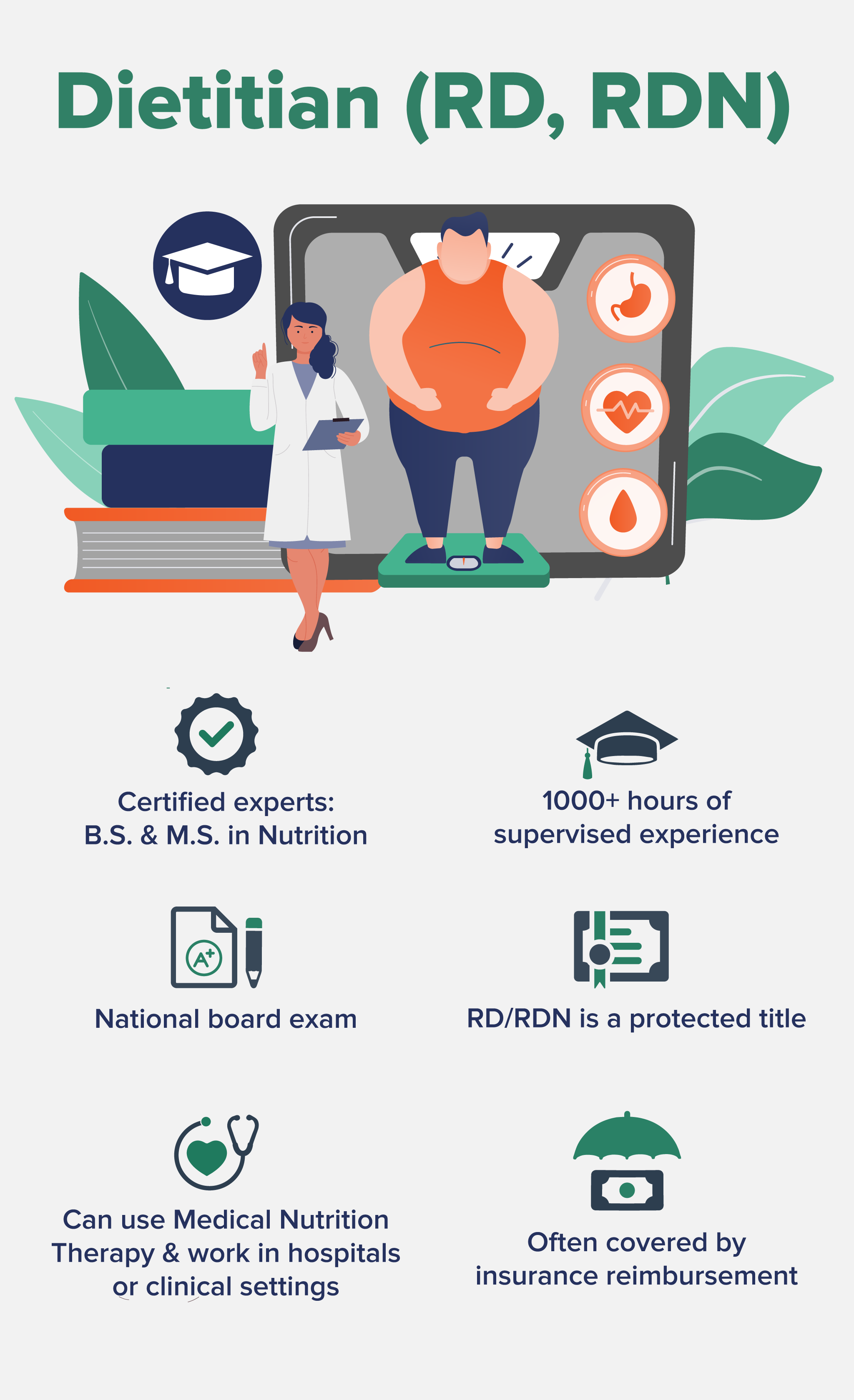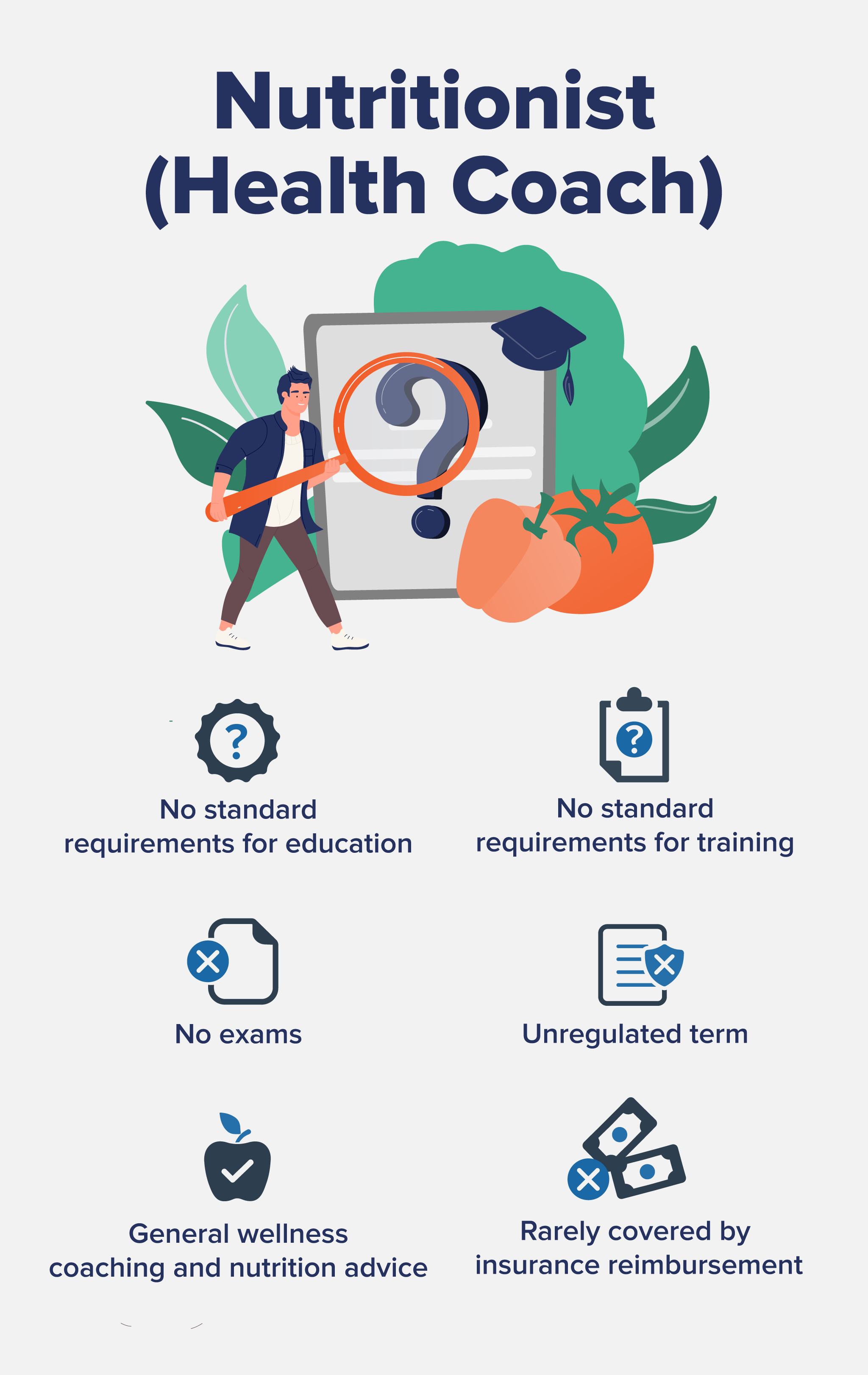Save $40 on your initial consult with a TNI Dietitian!
Talk to a real Dietitian for only $99: Schedule Now
Evidence Based Research To fulfill our commitment to bringing our audience accurate and insightful content, our expert writers and medical reviewers rely on carefully curated research.
Read Our Editorial Policy
Whether you need help managing a chronic condition, healing your relationship with food, or just want to feel better in your body, finding the right nutrition expert is an important step in your health journey.
The key difference? A dietitian is a licensed healthcare professional with rigorous training and credentials, while “nutritionist” is an unregulated term that almost anyone can use.
But it can understandably get confusing—with terms like dietitian, nutritionist, health coach, and CNS popping up on your search, you may wonder if there’s actually a difference between these professions. (Spoiler alert: there is!)
In this article, we’ll break down the key differences between dietitians and nutritionists, including what they study, how they’re trained, what they’re legally allowed to do, and how to choose the right one for you.
A Registered Dietitian Nutritionist (RD or RDN) is a qualified healthcare professional who’s trained to provide evidence-based nutrition care. In many states, RDs must also be licensed to practice, but licensing laws vary, so check your state’s rules.

Dietitians can do everything from managing chronic diseases with food to helping you navigate eating habits, weight concerns, and food-related medical conditions.
RDs have gone through extensive schooling, training, and a national credentialing exam to earn that title, which is different from someone just calling themselves a “nutritionist.”
It’s important to note that while all dietitians are nutritionists, not all nutritionists are dietitians.
Let’s take a closer look at the education, training, and scope of practice that RDs have.
RDs have completed degrees in nutrition, which include classes in biochemistry, biology, organic chemistry, anatomy, physiology, culinary science, nutrition counseling, and more.
These rigorous courses give dietitians the knowledge to understand how the body works and how food affects it.
A Bachelor of Science (BS) degree in nutrition or dietetics is required, and, as of 2024, new RDs must also have a Master of Science (MS) in nutrition.
Skip forums—get answers tailored to you in 45 minutes.
Skip forums—get answers tailored to you in 45 minutes.

To receive national and state licensure, RDs must pass a board exam, complete over 1,000 hours of supervised training in a dietetic internship, and maintain ongoing continuing education.
The dietetic internship program is typically 9 months to 1 year, providing RDs-to-be with 1,000-1,200 hours of hands-on practice in settings like hospitals, ICUs, community clinics, foodservice management, dialysis clinics, and outpatient counseling.
Not sure if your dietitian is legit? Verify their credentials here.
Some RDs undergo additional training to get specialized certifications and offer advanced, personalized care for conditions like digestive disorders, obesity, and pediatric nutrition.
The available specializations for RDs are:
If you need advanced care for one of these conditions or situations, consider looking for an RD with the appropriate certification.
Registered Dietitians are qualified to use medical nutrition therapy (MNT) to manage your chronic health condition.
This means that RDs can use their nutritional knowledge to help manage various chronic diseases, including cardiovascular disease, diabetes, hypertension, digestive issues (like IBS, ulcerative colitis, or Crohn’s disease), kidney disorders, and more.
But RDs aren’t just for people with chronic disorders—they also can provide nutritional counseling for people just looking to feel better or learn more about healthy eating.
However, while dietitians can assist with many aspects of your health, certain things fall outside their scope of practice and are best left to your doctors or other healthcare providers.
First, RDs cannot diagnose a health condition. While they can help you manage your condition through MNT, they cannot give you a diagnosis that you don’t already have. You need to consult with a doctor or other medical professional for a proper diagnosis.
RDs also cannot prescribe any medications. They can recommend supplements but not pharmaceuticals.
Lastly, in most states (especially in telehealth settings), RDs cannot directly order or request lab work (such as blood tests) because this typically requires a physician’s order.
That said, some states do allow RDs to order lab work if they have specific licensure or are practicing in integrated medical teams with a standing order or collaborative agreement. In all states, RDs can help you interpret your lab work or recommend that your doctor order a lab test.
Most insurance plans will reimburse visits to a Registered Dietitian (whether in person or virtual), especially if you have a chronic health condition like hypertension, cardiovascular disease, kidney disease, diabetes, or, in some cases, obesity.
Some plans also cover preventive services or annual wellness checkups that include nutrition counseling.
However, coverage depends on your insurance plan, your state’s regulations, and the reason for the visit—but many people qualify for covered visits, especially for chronic conditions.
While there are strict regulations and requirements for becoming an RD, the same cannot be said for nutritionists.

In the United States, “nutritionist” is not a regulated term—anyone can call themselves a nutritionist without undergoing certifications, designated coursework, or exams.
While this doesn’t necessarily mean that nutritionists are not knowledgeable, people using these terms do not have to undergo the same qualifying standards for education, clinical training, or licensure as RDs.
Nutritionists might have a Bachelor’s degree in nutrition, be self-taught, or have taken online courses—there’s really no telling which background you’ll get if you see a nutritionist.
However, there is a big difference between nutritionists and certified nutrition specialists (CNS), who are actually qualified and must complete education and training similar to RDs.
A CNS must complete the following:
However, while all RDs can use medical nutrition therapy, only certain CNSs may provide MNT, which depends on state regulations.
Overall, CNSs do not have the same legal recognition or nationwide licensure as RDs. The scope of practice can vary by state, and in some places, CNSs might be able to provide MNT if they work with a collaborating physician.
The bottom line is that a CNS is much more qualified than your average “nutritionist,” but not as universally recognized as an RD.
Again, a nutritionist may or may not have any training, but it’s most often self-taught or from online courses. A nutritionist will not have any legal credentials unless they are a CNS.
In general, nutritionists are people who help others improve their diets, but the scope of practice is much more limited than that of an RD (or CNS).
Nutritionists might provide help such as:
But because the title isn’t regulated, nutritionists have no standardized scope of practice. What they can legally do depends entirely on state laws, individual credentials, and licensure (if any).
Nutritionists without a license (i.e., not a CNS) cannot:
Visits to a nutritionist are very rarely covered by insurance. However, some states may reimburse you for seeing a CNS (Certified Nutrition Specialist), which is different from a nutritionist and requires additional training, as mentioned earlier.
Here’s a quick look at the key differences between a dietitian and a nutritionist (not a CNS).
| Registered Dietitian | Nutritionist | |
| Education | B.S. & M.S. in Nutrition (as of 2024) | Varies: no standard requirements |
| Training | 1000+ hours of supervised experience | Varies: no standard requirements |
| Exam | National board exam | None |
| Credentials | RD/RDN is a protected title | Unregulated term |
| Scope of Practice | Can use Medical Nutrition Therapy & work in hospitals or clinical settings | General wellness coaching and nutrition advice |
| Insurance Reimbursement | Often covered | Rarely covered |
If you’re generally healthy, don’t need chronic disease management through nutrition, and don’t mind if someone doesn’t have extensive clinical experience or nutritional education, a nutritionist might be fine for you—but be aware that the term is not regulated and you don’t know who you’re going to get.
Instead, if you want verified credentials or are dealing with chronic health issues, it’s best to look for an RD—like the ones at The Nutrition Insider. These protected titles ensure you’re working with someone who is qualified, certified, and legally authorized to offer personalized, evidence-based nutrition care.
If you’re ready to work with a highly qualified Registered Dietitian who can offer expert guidance tailored to your unique needs, schedule a virtual consultation with one of our RDs at Nutrition Insider today!